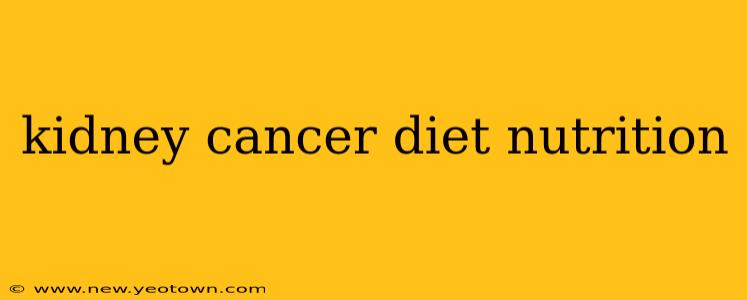The diagnosis of kidney cancer can be overwhelming, leaving you grappling with treatment options and uncertainties about the future. While medical intervention is paramount, focusing on your diet and nutrition can significantly impact your well-being during and after treatment. This isn't about a "miracle cure," but rather a supportive approach that can bolster your body's natural healing processes, improve your energy levels, and help manage side effects. This journey is about empowering yourself with knowledge and nourishing your body from the inside out.
My name is Dr. Anya Sharma, a registered dietitian specializing in oncology nutrition. I've spent years supporting patients navigating the challenges of cancer treatment, and I'm here to guide you through the complexities of a kidney cancer diet.
What to Eat: Building a Kidney Cancer-Friendly Diet
A healthy diet for someone with kidney cancer emphasizes whole, unprocessed foods rich in nutrients. Think vibrant colors, diverse flavors, and a balanced approach. Let's explore the key components:
Fruits and Vegetables: Your Arsenal of Antioxidants
Fruits and vegetables are packed with antioxidants, which help combat the damage caused by free radicals—unstable molecules linked to cancer development. Aim for a rainbow of colors—berries, leafy greens, broccoli, carrots—to ensure a wide range of phytonutrients.
Lean Protein: Fueling Repair and Recovery
Protein is crucial for tissue repair and immune function, both vital during cancer treatment. Choose lean sources like fish, poultry, beans, lentils, and tofu. These provide essential amino acids without the added fat and cholesterol often found in red meat.
Whole Grains: Steady Energy and Fiber
Whole grains, such as brown rice, quinoa, and oats, provide sustained energy and fiber, which aids digestion and can help manage side effects like constipation, a common issue with certain kidney cancer treatments.
Healthy Fats: Essential for Cellular Function
Healthy fats, like those found in avocados, nuts, and olive oil, are essential for hormone production and cellular function. They also help your body absorb fat-soluble vitamins.
What to Limit: Navigating Dietary Restrictions
While focusing on what to eat is crucial, understanding what to limit is equally important.
Red and Processed Meats: Minimizing Carcinogens
Red and processed meats are linked to an increased risk of certain cancers. While eliminating them completely might not be necessary, limiting their intake is advisable.
Added Sugars: Avoiding Unnecessary Calories
Added sugars contribute to weight gain and inflammation, neither of which benefits your body during cancer treatment. Opt for naturally sweet foods like fruits and limit sugary drinks.
Alcohol: Moderation is Key
Excessive alcohol consumption can interfere with treatment and overall health. If you choose to drink, do so in moderation.
Frequently Asked Questions (PAAs)
Here are some common questions I frequently receive from patients regarding diet and nutrition related to kidney cancer.
What are the best foods to eat during kidney cancer treatment?
The best foods are those rich in antioxidants, lean protein, fiber, and healthy fats. Prioritize fruits, vegetables, lean meats, whole grains, and healthy fats. A varied diet offers the broadest range of nutrients to support your body.
Are there any specific diets that can help fight kidney cancer?
While there isn't a single "miracle" diet, a well-balanced diet rich in whole foods, as described above, significantly contributes to overall health and well-being during and after kidney cancer treatment. Remember to consult your doctor or a registered dietitian before making significant dietary changes.
Should I avoid certain foods if I have kidney cancer?
Limiting red and processed meats, added sugars, and excessive alcohol is generally recommended. However, individual needs vary based on treatment and other health conditions. Always consult with your healthcare team for personalized dietary advice.
How can I manage weight loss or fatigue during kidney cancer treatment?
Frequent, smaller meals throughout the day can help manage fatigue and prevent significant weight loss. Focus on nutrient-dense foods to maximize caloric intake without overeating. Consult your doctor or a registered dietitian for personalized strategies to manage weight and fatigue.
Does a specific diet help with kidney cancer side effects?
Certain dietary modifications can help manage specific side effects. For example, increasing fiber intake can help with constipation, while staying hydrated can alleviate nausea. However, it's crucial to discuss any side effects with your healthcare team for personalized recommendations.
Conclusion: Your Journey Towards Wellness
Remember, nutrition plays a significant, supportive role in managing kidney cancer. This isn't about strict limitations, but about making informed choices to fuel your body and enhance your well-being throughout your journey. Always consult with your healthcare team and a registered dietitian for personalized guidance tailored to your specific needs and treatment plan. Your journey towards wellness is a collaborative one, and together, we can navigate this path effectively.

